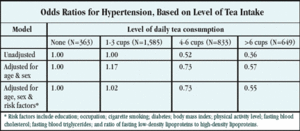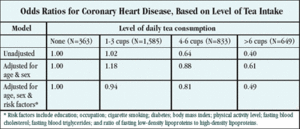Tea is considered the second-most consumed beverage in the world behind water. Legend holds that tea was discovered more than 5,000 years ago by a Chinese emperor, when leaves from a tea tree accidentally fell into his cup.1 Since then, tea has become a staple of Chinese culture and cuisine, with more than 1,000 types of tea on the market.
Although green tea is still the most popular form of tea, black tea has gained popularity in several parts of the world. In the production of black tea, the leaves are withered and rolled, then allowed to oxidize (or ferment) before being dried. Fermentation allows more of the leaves' flavor to come forth, resulting in a dark reddish or brownish-colored brew that gives black tea its name.
One country in which black tea is quite popular is Saudi Arabia. A recent study, published in the journal Preventive Medicine, examined the effectiveness of black tea in lowering the risk of heart disease in a cross-sectional survey of the Saudi population. Results showed a strong "protective association" between the consumption of black tea and risk of coronary heart disease (CHD), with higher levels of tea consumption corresponding to significantly lower incidences of heart disease and hypertension.2
The researchers interviewed 3,430 Saudi men and women between the ages of 30 and 70. All subjects were asked to fill out a structured questionnaire that included sections on medical history; family health history; physical activity levels; and dietary and social habits (including the daily consumption of tea and coffee). The subjects were also given two blood pressure exams, and blood samples were taken to analyze glucose and lipid levels. Results Just over 6% of the participants were diagnosed with coronary heart disease. The rate was slightly higher in women (7.4% to 5.2%), which the researchers suggested could be related to decreased activity levels and higher obesity levels in Saudi women. About 90% of those surveyed (91.8% men, 87.2% women) drank black tea on a daily basis, with one "cup" equivalent to 80 milliliters (approximately 2.7 ounces). Saudi men consumed an average of 5.6 cups of black tea per day, while Saudi women consumed 3.4 cups. Over 26% of the men drank six or more cups of tea daily; 11.9% of the women did the same. High tea consumption was associated with lower rates of hypertension. Those who drank more than six cups a day were 64% less likely to have hypertension than non-drinkers. When further adjustments were made to include risk factors such as blood cholesterol and triglyceride levels, people who drank six or more cups of tea daily were still 45% less likely to suffer hypertension than people who did not drink.

Similar results were seen with instances of coronary heart disease. Although subjects who drank 1-3 or 4-6 cups of tea per day had no or only modest reductions in CHD compared to non-tea drinkers, those who consumed more than six cups had a "significantly lower risk" for CHD versus non-drinkers - in some instances, as much as 60%. These findings remained constant even after the researchers adjusted for the risk factors listed in the questionnaire.

Interestingly, subjects who drank the most tea also participated in some unhealthy habits: 29.6% of the people who drank six or more cups of tea were also current or former cigarette smokers. Only 5.5% of non-drinkers currently or previously smoked cigarettes. The researchers speculated this could be due to the fact that tea drinking is a "common, popular habit" used in social settings in Saudi Arabia. While several studies have been published linking reduced risks of CHD and tea consumption, the reasons for the link remain undiscovered. Some scientists believe the high amount of antioxidants in tea - specifically, dietary flavonoids - is responsible. Others believe substances in tea reduce the clotting factor of platelets and keep arteries from hardening. Whatever the reasons for black tea's protective effects, the researchers feel it may be ideal for protecting the heart. As they noted in the study's conclusion: "In summary, the present cross-sectional study showed a protective association between black tea consumption and CHD among Saudi adults. More data from prospective cohort studies will help to distinguish whether tea drinking has a true biological effect, or whether it serves as a surrogate for a risk profile promoting lower CHD risk."
References
- China: Tea park steeped in tradition. CNN.com, January 7, 2003.
- Hakim IA, Alsaif MA, Alduwaihy M, et al. Tea consumption and the prevalence of coronary heart disease in Saudi adults: Results from a Saudi national study. Preventive Medicine January 2003;36:64-70.



